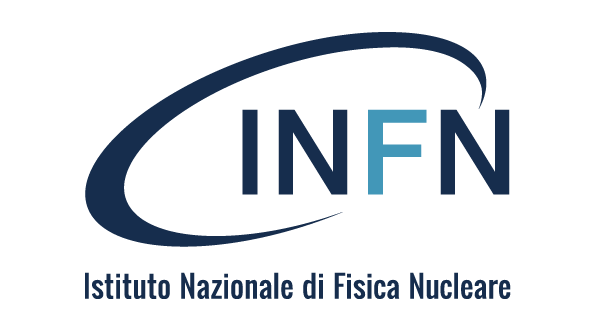PEOPLE
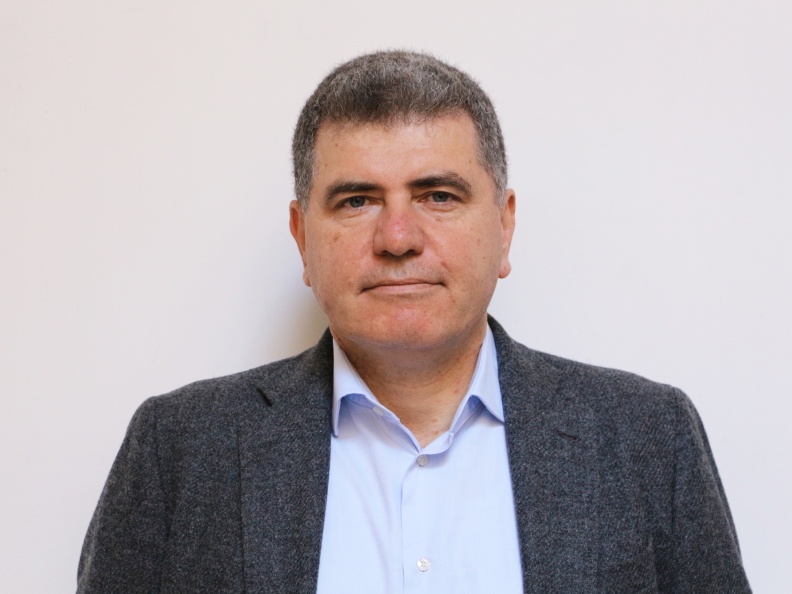
35 YEARS OF RESEARCH AT THE INFN GRAN SASSO NATIONAL LABORATORIES
Interview with Ezio Previtali, professor at the University of Milano-Bicocca and INFN researcher, director of the INFN Gran Sasso National Laboratories.
The celebrations for the 70th anniversary of the founding of INFN, which will end in September, provided the ideal setting to commemorate the foundation of many of the Divisions and Laboratories of the institute, spread throughout the country and branching out throughout the national university system. Among the structures that celebrated such milestones were the INFN Gran Sasso National Laboratories, a unique scientific reality and international benchmark for the field of neutrino physics and the search for dark matter, as well as a cutting-edge technology development center, which blew out 35 candles on 17 June. Founded in the late 1970s from an idea of Antonino Zichichi, then President of INFN, the Gran Sasso National Laboratories were established in 1985, when, alongside the tunnel connecting the Teramo and Aquila sides of the Gran Sasso massif, excavation work on the three rooms that constitute its underground infrastructure was completed. The start of the centre's scientific activities, on the other hand, dates back to 1987. Thanks to the 1,400 metres of rock above them, capable of shielding natural radiation, the laboratories have hosted innovative experiments of high sensitivity, such as Borexino and OPERA, just to name the most well-known, which generated fundamental results, such as the observation of the major stellar nuclear processes taking place in the Sun and detection the neutrino oscillation. After 35 years of activity and success, the Gran Sasso National Laboratories (LNGS) continue to fulfil their role as a privileged vantage point for rare physical phenomena, and are now preparing to welcome next-generation experiments through major maintenance and upgrade works. Coordinating this exciting transition phase is Ezio Previtali, head of LNGS since 15 October 2020. ...
What is the evaluation of the activities carried out by the Laboratories over the past two years and what do you think have been the main scientific and non-scientific achievements from the beginning of your office to date?
Even net of the latest success achieved by the Borexino experiment(see 'Borexino obtains the first experimental evidence of how massive stars shine', ed.), there has certainly been an important evolution of the experiments involving the direct search for dark matter, as demonstrated by the recent result of the XENON detector, which continues to be a global benchmark for research in this area.NEWS
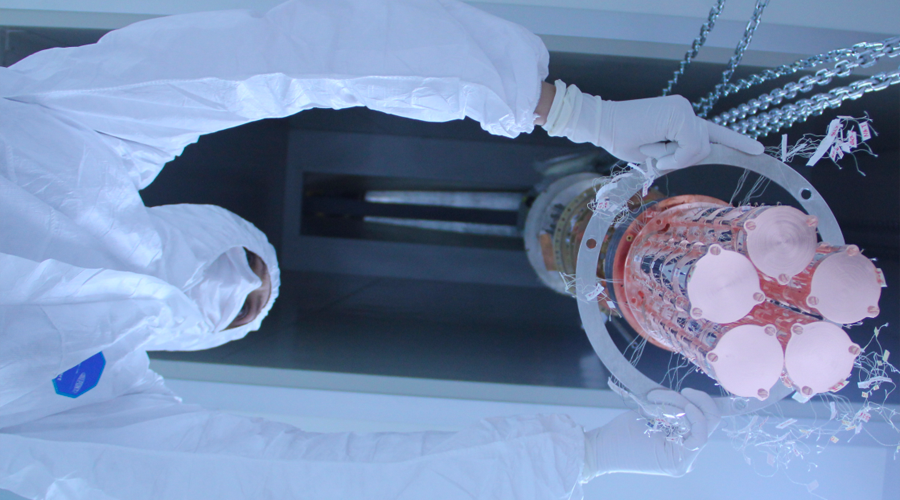
RESEARCH
CUPID-0: DEMONSTRATED A NEW TECHNOLOGY FOR THE HUNTING OF MAJORANA NEUTRINOS
Neutrino physics: a new article recently published on Physical Review Letters demonstrates the validity of the technology used by the CUPID-0 experiment, active at the INFN Gran Sasso National Laboratories, in the hunt for a very rare phenomenon known as "neutrinoless double beta decay", which would confirm, if observed, that the neutrino is a Majorana particle, coincident with its antiparticle.
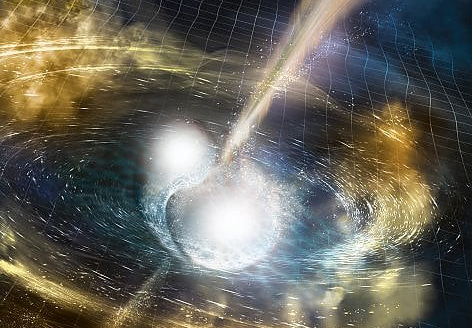
RESEARCH
ARTIFICIAL INTELLIGENCE WILL HELP MULTIMESSENGER ASTRONOMY
Artificial intelligence, which is increasingly pervasive in every area of our lives, could become a decisive tool also for future multi-messenger astronomy challenges in not too many years' time. With a work recently published on Nature Computational Science, a research group of the Virgo Collaboration, at EGO European Gravitational Observatory,has proposed an approach called 'multi-modal', which is used in many artificial intelligence (AI) applications that can integrate information and signals of different kinds, such as images, sounds, text.

APPOINTMENT
CERN, GIUSEPPE RUGGIERO IS THE NEW SPOKESPERSON OF THE NA62 COLLABORATION
The Italian Giuseppe Ruggiero, researcher at the National Institute of Nuclear Physics (INFN) and associate professor at the University of Florence, has been elected as the new spokesperson of the NA62 collaboration, operating at CERN. Starting from October 2022, Ruggiero will be driving the collaboration for the next 3 years.
FOCUS
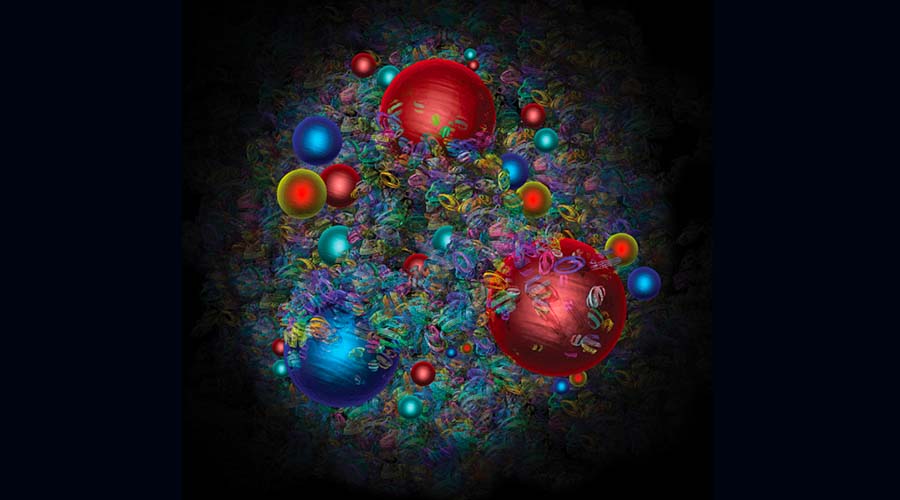 THE INTRINSIC CHARM OF THE PROTON
THE INTRINSIC CHARM OF THE PROTON
New research by the NNPDF (Neural Networks Parton Distribution Functions) collaboration, led by the University of Milan and INFN, could shed light on a surprising feature of the structure of protons. The study, published in the journalNature, indeed showed how 'charm' quarks, along with the better-known and lighter 'up' and 'down' quarks, are also to be counted among the intrinsic components of these atomic constituents, confirming a hypothesis developed more than 40 years ago. The result was achieved by adopting innovative machine learning techniques, thanks to which it was possible to analyse and solve in detail the large mass of data produced by particle colliders. In addition to improving the understanding of the structure of protons, which is still little known, the study will help to make the theoretical description of collisions between these particles more accurate, facilitating the observation of possible clues to new physics.
TAKE PART IN
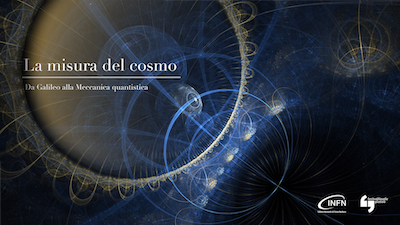 FROM GALILEO TO QUANTUM PHYSICS AT THE PHILOSOPHY FESTIVAL
FROM GALILEO TO QUANTUM PHYSICS AT THE PHILOSOPHY FESTIVAL
Once again this year, INFN is taking part in festivalfilosofia, scheduled for 16-18 September 2022, in Modena, Carpi and Sassuolo. The festivalfilosofia, now at its 22nd edition, aims to be a space for philosophical and cultural dialogue and debate, with a dense programme of lectures, exhibitions, performances, readings, children's activities and philosophical dinners. The meeting organised by INFN will be hosted at the Piazza Martiri in Carpi and will focus on the radical change that quantum mechanics triggered in early 20th-century physics, revolutionising its foundations and even the notion of measuring reality....
INFORMATION AND CONTACT
Images cover
Cover image: LNGS INFN
INFN - COMMUNICATIONS OFFICE
comunicazione@presid.infn.it
+39 06 6868162
EDITORIAL BOARD
Coordination:
Francesca Scianitti
Project and contents:
Cecilia Collà Ruvolo, Eleonora Cossi, Matteo Massicci, Anna Greco, Francesca Mazzotta, Francesca Scianitti, Antonella Varaschin
Design and Mailing Coordinator:
Francesca Cuicchio
Gaia Stirpe
Translation
ALLtrad
ICT service:
Servizio Infrastrutture e Servizi Informatici Nazionali INFN
Collaboration on this issue:
Diego Tonini, INFN Ufficio Trasferimento Tecnologico
